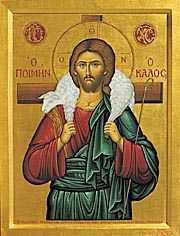In the post of 12 March, we heard Jesus warn us about becoming people whose “heart has become gross, and their ears are dull of hearing…” The post suggested that one way to open more fully to the Word of God was to try to hear it in a fresh version and with fresh ears.
The English version of the Lord’s prayer that we are all familiar with favors the preferences of translators from Latin and does not fully reflect the understanding of the apostolic Churches regarding the place of the Eucharist in relation to the prayer. Nor does it make clear that it is not our God that is the maker of the temptations that we face, but rather that they arise from the evil one and due to our own failings before God and man.
In the spirit of freshening, we offer you another translation of the Lord’s Prayer, an English version that better reflects the nuances of the original Greek that the Eastern Orthodox Churches recites on a daily basis (as well as the Slavonic.) This version does not originate with me; in fact, it is used in Lenten services in an Orthodox parish precisely for the oppor tunity to hear it fresh and embrace it more fully. I hope you will share in that blessing.
tunity to hear it fresh and embrace it more fully. I hope you will share in that blessing.
OUR FATHER IN HEAVEN, hallowed be your name. Your kingdom come. Your will be done on earth as in Heaven. Our bread for the Morrow give us today. Forgive us our sins as we forgive those who sin against us. Save us from the time of trial and deliver us from the evil one. For yours is the power, and the glory, unto the ages. Amen.